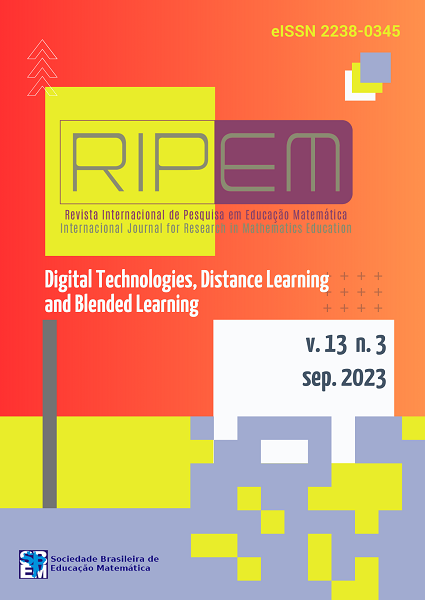Remote teaching in the Mathematics degree course at the Federal University of Acre: perspectives, difficulties and future possibilities
DOI:
https://doi.org/10.37001/ripem.v13i3.3366Palavras-chave:
Mathematics Education, Digital Technologies, Covid-19, Emergency Remote TeachingResumo
This research aimed to identify potentialities and protect from remote moments between professors and students of the Mathematics Degree Course at the Federal University of Acre during the pandemic moment, as well as actions that can be worked on by the subjects for a “next” post-pandemic. As methodological resources and source of information, teachers and students were consulted through an intuitive command to identify difficulties/concerns and possibilities with respect to development actions in the period called Emergency Remote. This investigation was qualitative in nature, as I understand that I deepened the understanding of the social group in question and its trajectory does not require quantification. The information was processed in the light of the Philosophy of Mathematics Education, Critical Mathematics Education and Digital Technologies in Mathematics Education. The quality of the students' internet and the possibilities for evaluating students by teachers represented the greatest difficulties encountered during the pandemic.
representaram as maiores dificuldades encontradas no momento pandêmico.
Downloads
Referências
Bacich, L.; Tanzi Neto, A. & Trevisani, F. M. (Org.) (2015) Ensino HÃbrido: Personalização e Tecnologia na Educação. Porto Alegre, RS: Penso.
Bicudo, M. A. V. & Garnica, A. V. M. (2001). Filosofia da Educação Matemática. Belo Horizonte, MG. Autêntica.
Borba, M. C. & Skovsmose, O. (1996). The Ideology Of Certainty. New York, NY: Jstor.
Borba, M. C. (2021). The future of mathematics education since COVID-19: Humans-with-media or humans-with-non-living-things. Educational Studies in Mathematics, 108(1-2), 385-400.
Borba, M. C.; Gracias, T. A. & Chiari, A. S. S. (2015). Retratos da pesquisa em Educação Matemática online no GPIMEM: um diálogo assÃncrono com quinze anos de intervalo. Educação Matemática Pesquisa, 17(5), 843-869.
Domingues, N. S. (2020). Festival de VÃdeos Digitais e Educação Matemática: uma complexa rede de Sistemas Seres-Humanos-Com-MÃdias. 279 f. Tese (Doutorado em Educação Matemática). Universidade Estadual Paulista. Rio Claro, SP.
Engelbrecht, J.; Borba, M. C.; Llinares, S. & Kaiser, G. (2020). Will 2020 be remembered as the year in which education was changed? ZDM Mathematics Education, 52, 821-824.
Engelbrecht, J.; Llinares, S. & Borba, M. C. (2020). Transformation of the mathematics classroom with the internet. ZDM Mathematics Education, 52, 825-841.
Goldenberg, M. (2011). A arte de pesquisar: como fazer pesquisa qualitativa em Ciências Sociais. Rio de Janeiro, RJ: Record.
Jewitt, C.; Bezemer, J. & O’halloran, K. (2016). Introducing Multimodality. New York, NY: Rout ledge.
Kaptelinin, V. & Nardi, B. (2006). Acting with technology: Activity theory and interaction design. Cambridge, MA: The MIT Press.
Kenski, V. M. (2013). Tecnologias e tempo docente. Campinas, SP: Papirus.
Melo, J. R.; Silva, S. R. P.; Silveira, M. E. R. A.; Souza, G. M. A.; Silva, B. L. R; Freitas, A. S.; Silva, G. B.; Linhares, I. H. & Filho, A. M. M. (2021). Ensino e aprendizagem através de vÃdeos e tutoria virtual durante o perÃodo de pandemia. In: E. S. Navarro & M. C. Souza (Org.). Educação Matemática em Pesquisa: Perspectivas e Tendências. (3. ed. pp. 235-245). São Paulo, SP: CientÃfica Digital.
Moore, M. Theoretical Principles of Distance Education (1993). In: D. Keegan (Ed.). Theorical Principles of Distance Education. New York: British Library.
Moreira, M. A. (2006). A teoria da aprendizagem significativa: e sua implementação em sala de aula. BrasÃlia, DF: Editora UnB.
Neves, L. X. (2020). Intersemioses em vÃdeos produzidos por licenciandos em Matemática da UAB. 304f. Tese (Doutorado em Educação Matemática). Universidade Estadual Paulista. Rio Claro, SP.
Neves, L. X.; Bárbara, C. F. & Silva, S. R. P. (2022). Reflexões sobre o uso e a produção de vÃdeos no ensino de Matemática. Educação e Ensino de Ciências e Matemática: pesquisa, aplicações e novas Tendências. São Paulo, SP: CientÃfica Digital.
Silva, S. R. P. (2018). VÃdeos de conteúdo matemático na formação inicial de professores de Matemática na modalidade a distância. 247f. Tese (Doutorado em Educação Matemática). Universidade Estadual Paulista Júlio de Mesquita Filho. Rio Claro, SP, 2018.
Skovsmose, O. & Borba, M. C. (2004). Research methodology and critical mathematics education. In: P. Valero & R. Zevenbergen. (Ed.). Researching the socio-political dimensions of mathematics education: Issues of power in theory and methodology. (pp. 207-226). Boston, MA: Kluwer.
Skovsmose, O. (1994). Towards a critical mathematics education. Educational Studies in Mathematics, 27(1), 35-57.
Souza, M. B de. (2021). VÃdeos digitais produzidos por licenciandos em Matemática a distância. 242f. Tese (Doutorado em Educação Matemática). Universidade Estadual Paulista. Rio Claro, SP.
Universidade Federal do Acre. (2021). Resolução Conselho Universitário nº 52, de 19 de outubro de 2021. Autoriza o retorno gradual e seguro das atividades acadêmicas e administrativas presenciais no âmbito da Universidade Federal do Acre. Rio Branco, AC.
Publicado
Como Citar
Edição
Seção

Este trabalho está licensiado sob uma licença Creative Commons Attribution-NonCommercial-ShareAlike 4.0 International License.








